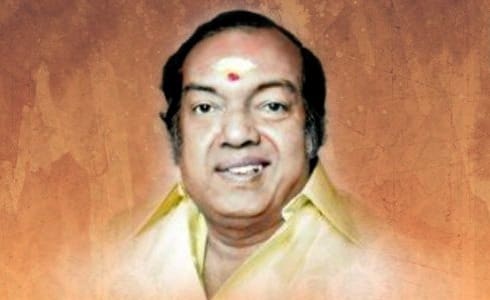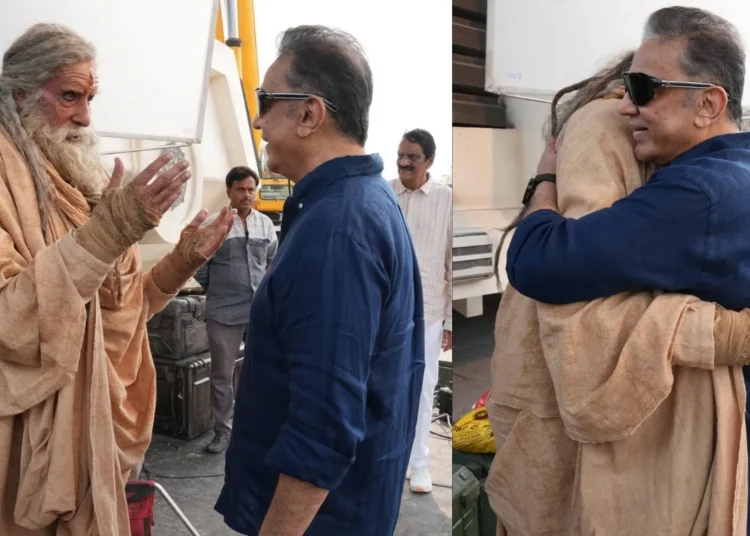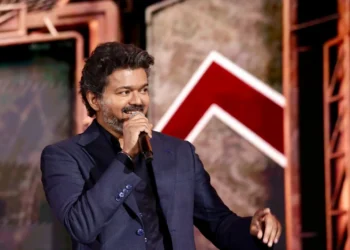Today marks the birthday of one of India’s most prolific and revered figures in the realm of literature and cinema—Kannadasan. Born on June 24, 1927, and departing on October 17, 1981, Kannadasan’s journey spanned across various roles including philosopher, poet, lyricist, producer, actor, and philanthropist. His influence extends far and wide, earning him the title of “Kaviarasu,” meaning the King of poets, a fitting tribute to his unparalleled contribution to Tamil literature and Indian cinema.
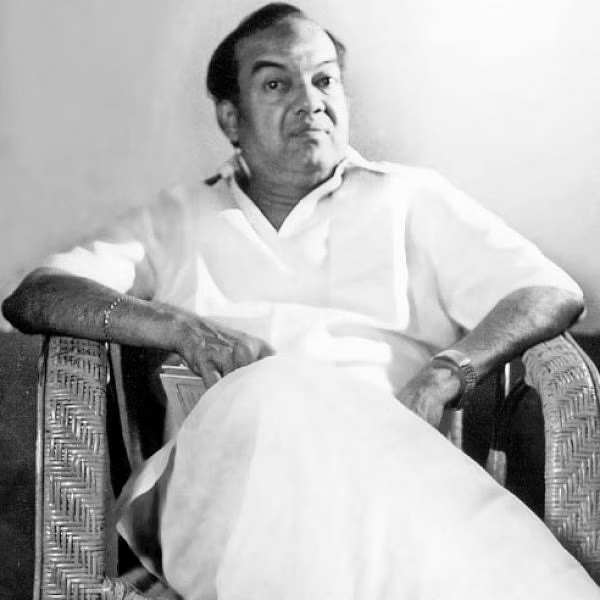
The Genius of His Pen
Kannadasan’s lyrical prowess is perhaps his most celebrated legacy. With over 5000 film songs to his credit, his verses resonated deeply with generations of music lovers. Each song he penned carried a unique blend of emotion, philosophy, and cultural richness, making them timeless classics. His ability to seamlessly weave intricate emotions and profound meanings into simple yet impactful lyrics set him apart as a master wordsmith.
Iconic Songs That Define an Era
Among Kannadasan’s vast repertoire, several songs stand out as timeless classics that continue to captivate audiences:
Kaalangalil Aval Vasantham (Paava Manippu)
The song “Kaalangalil Aval Vasantham” from the movie “Paava Manippu” (1961) is a testament to Kannadasan’s mastery of Tamil lyrics. Sung by PB Sreenivas and composed by MS Viswanathan, this song eloquently describes the actress through the actor’s perspective. Kannadasan showcases his prowess by using exquisite Tamil words to depict the woman in the purest form. Rather than directly stating her beauty, the lyrics paint her as the epitome of grace and charm, capturing her essence in the most sublime manner possible. This approach not only highlights Kannadasan’s poetic finesse but also enhances the song’s poetic depth and emotional resonance, making it a timeless piece of Tamil cinema’s musical legacy.

Kaalangalil aval vasantham, Kalaigalilae aval oviyam
Maathangalil aval maargazhi, Malargalilae aval malligai
Ninaipathellam Nadanthuvittal (Nenjil Oru Aalayam)
The song “Ninaipathellam Nadanthuvittal” from the 1962 film “Nenjil Or Aalayam” captures the poignant reality of life—that things do not always unfold as we wish. It reflects on the presence of a higher power, God, who guides us towards what we truly need amidst our disappointments and shattered dreams. Kannadasan’s lyrics offer solace to hearts burdened with pain from dashed hopes, conveying the profound truth that life’s path often leads us to destinations unknown and difficult to accept. Despite being penned in the 1960s, the song’s message resonates universally, touching upon the timeless struggles and uncertainties inherent in every individual’s journey through life.
Engae vazhkkai thodangum athu, Engae evvitham mudiyum
Idhuthaan paathai.. idhuthaan payanam, Enbathu yaarukkum theriyaathu
Malarnthum Malaratha (Pasamalar)
The song “Malarnthum Malaratha” from the film “Pasamalar,” released in 1961, portrays the deep love shared between a brother and sister who have been estranged by the influence of their respective spouses’ families. Kannadasan’s poignant lyrics beautifully express the siblings’ enduring affection, as they reminisce about their cherished bond and singing it as lullabies to their own children. The song delicately traces their journey from childhood companionship to their painful separation in adulthood, capturing the bittersweet nostalgia of their shared past. Kannadasan’s heartfelt verses resonate profoundly with audiences, evoking universal sentiments of brother-sister love and loss, making “Malarnthum Malaratha” a timeless ode cherished by siblings everywhere.

Kannil mani pola, maniyin nizhal pola kalanthu piranthomada
Intha mannum kadal vaanum marainthu mudinthaalum, maraka mudiyathada, uravai pirike mudiyathada
Mayakkama Kalakkama (Sumai Thangi)
The song “Mayakkama Kalakkama” from the film “Sumai Thangi,” released in 1962 and sung by PB Sreenivas, stands out as a powerful motivational anthem. It has had a profound impact on individuals facing adversity, as evidenced by lyricist Vaali’s own experience. In an interview, Vaali recounted how, disheartened by his prospects in the film industry, he had contemplated returning to his hometown to pursue alternative livelihoods. However, upon hearing “Mayakkama Kalakkama,” Vaali found renewed inspiration to persevere in his pursuit of opportunities. This pivotal moment marked a turning point in his career, ultimately propelling him to become one of the industry’s foremost lyricists.

Kannadasan’s verses in this song exude a reassuring message of resilience and optimism in the face of challenges. They instill confidence and hope, encouraging listeners to embrace the present moment with acceptance while entrusting the future to a higher power. The song’s uplifting themes and empowering lyrics continue to resonate with audiences, offering solace and motivation to those navigating difficult times.

Naalai pozhuthai Iraivanuku alithu, nadakkum vaazhvil amaithiyai thedu
Unakum keele ullavar kodi, Ninaithu paarthu nimmathi naadu
Aaru Maname Aaru (Aandavan Kattalai)
The song “Aaru Maname Aaaru” from the 1964 film “Aandavan Kattalai” encapsulates profound human philosophy through Kannadasan’s poetic mastery. Using simple yet evocative language, Kannadasan beautifully articulates the essence of human behavior and life’s principles that resonate universally, transcending boundaries of language and culture. The song captures the inherent goodness and virtues that every individual should embody. Kannadasan’s lyrics evoke a deep sense of introspection and understanding, urging listeners to embrace these virtues in their own lives.
Aasai, kovam, kalavu kondavan pesa terintha mirugam
Anbu, nandri, karunai kondavan manitha vadivil theivam
Ullathil Nalla Ullam (Karnan)
The song “Ullathil Nalla Ullam” from the 1964 film “Karnan,” based on the epic Mahabharata and its character Karnan, beautifully portrays his essence of sacrifice and unwavering principles. Penned by Kannadasan, the lyrics vividly depict Karnan’s legacy of generosity and commitment to fulfilling the requests of those in need, even unto his last breath. It reflects Karnan’s dedication to righteousness and his selfless nature, emphasizing his readiness to help others without hesitation or reservation.

Ullathil nalla ullam urangathenbathu, vallavan vaguthathada
Karna varuvathai ethirkollada
Paramasivan Kazhuthil (Suryagandhi)
The song “Paramasivan Kazhuthil” from the 1973 film “Suryagandhi” holds a unique significance as it features Kannadasan himself singing on screen during a stage performance. Known for his profound wisdom, Kannadasan’s lyrics in this song delve into philosophical reflections on life. The song eloquently portrays the realities of life, emphasizing the intrinsic value of individuals and the importance of dignity. Kannadasan’s lyrical prowess shines through as he explores profound themes that resonate universally. His ability to capture the essence of life’s complexities and impart meaningful insights distinguishes him as a remarkable lyricist.

Uyarntha idathil irukum pothu, ulagam unnai mathikkum
Un nelamai konjam irangi vanthaal, nizhalum unnai mithikkum
Deivam Thantha Veedu (Aval Oru Thodarkathai)
The song “Deivam Thantha Veedu” from the film “Aval Oru Thodarkathai” stands as another poignant creation by Kannadasan, showcasing his profound insights into life’s essence. Through his lyrics, Kannadasan conveys the message that everyone’s life is governed by fate, and that life unfolds according to its own course from birth to death. He touches upon the transient nature of existence, highlighting the impermanence of all things. In addition to these reflections, Kannadasan intertwines elements of Saiva philosophy, demonstrating his deep understanding and philosophical depth. His wisdom shines through in the profound verses of the song, where he explores existential themes with clarity and sensitivity.
Aathi veedu, antham kaadu, ithil naan enna, adiye nee enna nyana penne
Vaazhvin porul enna, nee vantha kathai enna
Kanne Kalaimaane (Moondram Pirai)
The song “Kanne Kalaimaane” is a classic Tamil melody from the film “Moondram Pirai” (1982), known for its poetic brilliance and emotional depth in Kannadasan’s lyrics. Sung by K.J. Yesudas and composed by Ilaiyaraaja, the song captures the essence of love and longing with unparalleled grace. Kannadasan’s choice of words and metaphors evoke a sense of timeless romance, enriching the emotional landscape of the song. The verses of “Kanne Kalaimaane” are infused with Kannadasan’s signature style, which blends poetic elegance with profound philosophical insights. Through his lyrics, he not only celebrates the beauty of love but also explores the complexities of human emotions, making the song resonate with listeners on a profound level. This song continues to captivate the hearts of many even to this day.

Kaadhal konden kanavinai valarthen, kanmani unnai naan karuthinil niraithen
Unakae uyiraanen ennalum ennai nee maravadhae, nee illaamal ethu nimathi, nee thaan endrum en sannithi

Kannadasan, the prolific lyricist and poet, breathed his last on October 17, 1981, while attending a Tamil conference in Chicago, USA, organized by the Tamil Association of Chicago. He was 54 years old at the time of his passing. Despite his sudden demise, Kannadasan’s creative spirit remained vibrant until the end. His final contribution to Tamil cinema, the song “Kanne Kalaimane” from the film ‘Moondram Pirai’, was released posthumously, adding to his illustrious repertoire of timeless compositions.
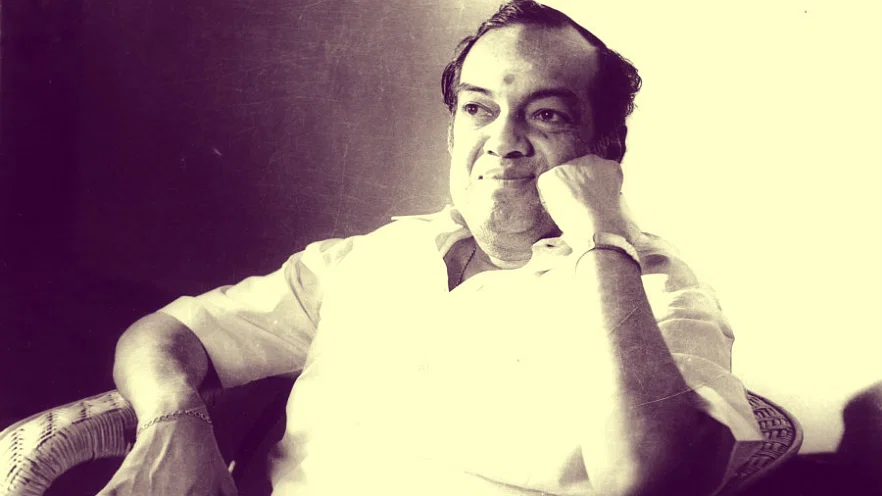
Throughout his career, Kannadasan had been a stalwart in the world of Tamil literature and film, known for his ability to intricately weave emotions, philosophy, and social commentary into his lyrics. His profound understanding of human nature and his mastery of language allowed him to capture the hearts of audiences across generations. Even after his death, Kannadasan’s legacy continues to inspire and influence aspiring lyricists and poets, cementing his place as one of Tamil Nadu’s most revered literary figures.
Follow us on Instagram, Facebook or Telegram for more updates and breaking news.


